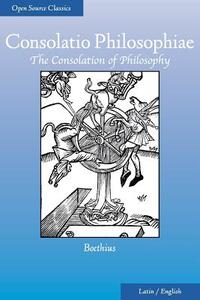Take a photo of a barcode or cover
reflective
medium-paced
challenging
informative
reflective
slow-paced
challenging
hopeful
informative
reflective
medium-paced
challenging
informative
reflective
medium-paced
I definitely did like and understood this book better the second time around. The third time is the charm, or so they say. St. Augustine meets Socrates. Boethius cannot escape (and doesn't seem to want to do it at all) the neoplatonic influence that Christian thought had in its early stage.
In a dialogue before he dies, Boethius meets Philosophy as a lady that will ultimately speak to him about what really matters and whether any of our worldly ambitions has any merit before the first. Then it will turn into a theological and moral treatise of sorts: why do some people seem to have better "luck" than others despite being evil? Are we really free? Is there such a thing as free will? Do our prayers matter or move God in any way?
Those are problems even the gnostics posed, although with unsatisfying answers. Understanding how providence works is not a matter of rules of purely unpredictable events, or predestination in such a way that seeks to deliberately punish anyone before they have any occassion to decide. Fortune, as volatile as it is, can be a good teacher for temperance and excericse of virtue, both for those who are training themselves on the path to sainthood, and for those who don't seem to be able to abandon any vice, it can act as some correction of our wrong deeds. But ultimately, it reminds us that anything we might possess here is temporal, that our duty is to return to God.
In a dialogue before he dies, Boethius meets Philosophy as a lady that will ultimately speak to him about what really matters and whether any of our worldly ambitions has any merit before the first. Then it will turn into a theological and moral treatise of sorts: why do some people seem to have better "luck" than others despite being evil? Are we really free? Is there such a thing as free will? Do our prayers matter or move God in any way?
Those are problems even the gnostics posed, although with unsatisfying answers. Understanding how providence works is not a matter of rules of purely unpredictable events, or predestination in such a way that seeks to deliberately punish anyone before they have any occassion to decide. Fortune, as volatile as it is, can be a good teacher for temperance and excericse of virtue, both for those who are training themselves on the path to sainthood, and for those who don't seem to be able to abandon any vice, it can act as some correction of our wrong deeds. But ultimately, it reminds us that anything we might possess here is temporal, that our duty is to return to God.
inspiring
reflective
medium-paced
We generally imagine the fall of Rome as the beginning of The Dark Ages, with thought going from philosophy and reason to Dark Age superstition…. I feel like reading this book lets you witness this process firsthand.
The first half of this book very much follows “classical” thought of stoics/epicureans and feels like a classical philosophy book, attempting to derive some sort of first principles and then applying them to daily life for practical advice on how to reason about the world and our reality.
Then, around the halfway mark, it basically becomes “you don’t know God’s plan, nor can you” said in so many ways. It was this general attitude that led to the anti-intellectual period of the Dark Ages… that attempting to even understand what’s going on in the world is an act of arrogance and defiance of God.
This book doesn’t go that far, but you can see the seeds of such thought coming in.
All that having been said, the first half or so is really nice and the circumstances of the book being written are harrowing and admirable enough to be worth the read if you like the classics.
The first half of this book very much follows “classical” thought of stoics/epicureans and feels like a classical philosophy book, attempting to derive some sort of first principles and then applying them to daily life for practical advice on how to reason about the world and our reality.
Then, around the halfway mark, it basically becomes “you don’t know God’s plan, nor can you” said in so many ways. It was this general attitude that led to the anti-intellectual period of the Dark Ages… that attempting to even understand what’s going on in the world is an act of arrogance and defiance of God.
This book doesn’t go that far, but you can see the seeds of such thought coming in.
All that having been said, the first half or so is really nice and the circumstances of the book being written are harrowing and admirable enough to be worth the read if you like the classics.
challenging
reflective
medium-paced
I think the book is really interesting and it answers a lot of questions of the period it was written regarding issues about God and faith and the role of luck (after all the writer got executed in a year or less after this book , he was in jail while writing this book poor guy) . My problem with this book is that there were some points where I felt the writing was a little bit dense and I had to squint my eyes, trying to make my dumb brain understand what this dude was meaning to say. But all in all I have lots of things to think about and maybe I'll reread it in the future. Although I'm an atheist, this book can be read by anyone.
This is a very quaint book. Is it particularly well-done philosophy? No. It would work quite well as therapy though. Its lines of logic remind me greatly of those used by the various Stoic Instagram accounts which implore you to go into business. Not particularly advanced stuff. But very nice, and comforting. Quaint.
". . . nothing is miserable unless you think it so; and on the other hand, nothing brings happiness unless you are content with it."
"If you want to see the truth in clear light, and follow the right road, you must cast off all joy and fear. Fly from hope and sorrow. When these things rule, the mind is clouded and bound to the earth."
". . . integrity of conscious is somehow spoiled when a man advertises what he has done and receives the reward of public recognition."
". . . although nature makes very modest demands, avarice is never satisfied. My present point is simply this: if riches cannot eliminate need, but on the contrary create new demands, what makes you suppose that they can provide satisfaction?"
". . . true and perfect happiness is that which makes a man self-sufficient, powerful, worthy of reverence and renown, and joyful."
"If you would give every man what he deserves, then love the good and pity those who are evil."
"If you want to see the truth in clear light, and follow the right road, you must cast off all joy and fear. Fly from hope and sorrow. When these things rule, the mind is clouded and bound to the earth."
". . . integrity of conscious is somehow spoiled when a man advertises what he has done and receives the reward of public recognition."
". . . although nature makes very modest demands, avarice is never satisfied. My present point is simply this: if riches cannot eliminate need, but on the contrary create new demands, what makes you suppose that they can provide satisfaction?"
". . . true and perfect happiness is that which makes a man self-sufficient, powerful, worthy of reverence and renown, and joyful."
"If you would give every man what he deserves, then love the good and pity those who are evil."






